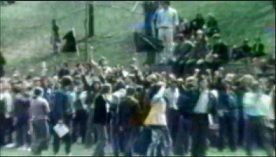 When the neocons planned out the Bush Iraqi adventure the wave of popular sentiment toward the military arising from the first Gulf War had crested and begun to ebb. The undertow was Viet Nam. Somehow they had to make their war invulnerable to criticism. They found a shield: the troops.
When the neocons planned out the Bush Iraqi adventure the wave of popular sentiment toward the military arising from the first Gulf War had crested and begun to ebb. The undertow was Viet Nam. Somehow they had to make their war invulnerable to criticism. They found a shield: the troops.
Psychological operations directed against the people of the United States are not lawful. But the propaganda was so subtly crafted that the constant mantra, “Support the Troops,” was never recognized for the actual message being delivered. The Iraq War was unassailable because to criticize the war was to criticize the troops. Then an unlikely propaganda ally gave the neocons 9/11. Politicians feared airing questions that begged to be asked. The military and veteran bandwagon took on a life of its own. There was no support for mass demonstrations against the war. Senior officers could take bribes and give girlfriends classified documents without indignation from our elected representatives. Support the Troops. What a contrast to the Viet Nam era. But in the end, how much support is there: compare the spending on veterans’ programs to that on the continuing operations in Iraq and Afghanistan.
As the 1960’s progressed, that war touched home more and more. What distinguished then from now were conscription, body bags, a Congress with many members who had served in combat, and a news media capable of asking questions. With the draft, the military was more representative of us. Today you often hear that no one was forced to serve. Someone from almost every American village died in Viet Nam; during this war we were shielded, even barred, from the reality and casualties were avoided. Military members had voices in the 60’s Congresses; in today’s Congress few can ask an insightful question and it is the military brass that represents its members. The media tiptoes around military issues fearing alienating the market upon which they rely economically. In the ’60’s, objective reporting was rewarded in the marketplace.
Last week the Corporation for Public Broadcasting affiliates aired My Lai, a program in the American Experience series. My Lai was the watershed event that turned the American consensus against the war. You have to worry what the next event will be that touches home and leads us toward a regression to the historical entanglement mean. Always remember, the enemy gets a vote.
Tonight and tomorrow there are four programs that can help those too young to recall the Viet Nam era and those who would rather forget it understand that despite the angst of that period, Americans took much more responsibility for and participation in the dialogue that guided their nation’s course. Tonight the programs address the draft, the soldiers’ experience, and contemporaneous coverage in the media featuring Dick Cavett’s interviews.
To grasp the Viet Nam experience is to gain a more appropriate perspective on today’s poisoned political environment.
Check local listings for times tonight and later this week:
- The Draft
- Dick Cavett’s Viet Nam
- Viet Nam War Stories
- The Day the ’60s Died
The Vietnam War is recalled via Dick Cavett’s contemporaneous late-night talk show and such guests as Warren Beatty, Jane Fonda, Groucho Marx and Paul Newman; Barry Goldwater, Wayne Morse, Edmund Muskie and Hubert Humphrey; and Muhammad Ali. The documentary also includes new insights from Cavett, Gen. Wesley K. Clark (USA Ret.), author Fredrik Logevall (“Embers of War”) and historian Timothy Naftali; and an archival performance of “Volunteers” by Jefferson Airplane.

![[UPDATED with Official Announcement] Audio: VA Del. Dan Helmer Says He’s Running for Congress in the Newly Drawn VA07, Has “the endorsement of 40 [House of Delegates] colleagues”](https://bluevirginia.us/wp-content/uploads/2026/02/helmermontage.jpg)
















